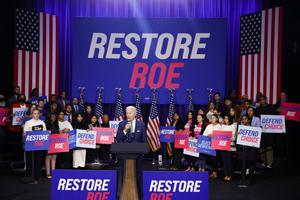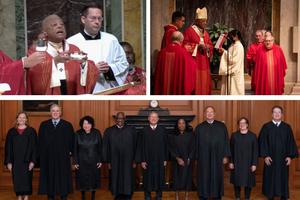Faithful Catholics and the Midterms: What to Do?
COMMENTARY: As our faith teaches, we need to bring our beliefs to bear on the public square.

On Tuesday, Nov. 8, Americans will return to the polls. U.S. elections can be really dirty battlegrounds — and for orthodox Catholics the sense that something has gone seriously wrong with society is overpowering.
Secular progressives, some of them identifying as Catholics, want to outlaw some of our most sacred freedoms — not just free speech but, unbelievably, the right of unborn babies to live. Meanwhile, a much smaller group of Catholics, the so-called Integralists, are wasting our time by drawing up fantasy plans for an authoritarian state that will supposedly restore Christian values.
It's disheartening, but it’s precisely at moments like these that we American Catholics need to bring our deepest beliefs into the public square. The first step is to inform ourselves. The Register has a treasure trove of information on its website about the midterm elections. Take the time to review its archived materials.
We must also be mindful as to what is at stake in our upcoming federal and state elections. A total of 469 seats in the U.S. Congress (435 House seats and 34 Senate seats) are up for election. The outcomes of these elections will affect the balance of power in the legislative branch of our government.
A super-majority of Democrats, for example, could overturn any filibuster opposition to proposals like the Equality Act — the radical expansion of the Civil Rights Act of 1964 to include sexual orientation and gender identity that specifically abolishes accommodations for religious-based objections and could even be interpreted as creating an abortion right.
Mary Hasson, co-founder of the Catholic Women’s Forum, testified in 2021 before the Senate Judiciary Committee against the Act, stating that “the Equality Act threatens serious harm to religious believers and religious organizations, stripping away crucial protections afforded under the Religious Freedom Restoration Act — a law enacted in 1993 with overwhelming, bipartisan support. The Equality Act attacks First Amendment rights as well, inserting language that attempts to tip the scales against believers if they assert claims under the First Amendment or Equal Protection.”
So let this be our starting point. Where do candidates stand on the Equality Act? We need to go to public meetings and put them on the spot. And we don’t stop there. What about their views on the family, the role of parents in public schools, the freedom to uphold the Christian meaning of marriage, the need to care for the environment and attend to the needs of the immigrant and displaced?
It’s particularly important for Catholics to pay attention to state elections. Specifically, when the Supreme Court in Dobbs overturned a decades-old, court-created constitutional “right to abortion,” it also freed individual states to regulate the practice. A recent post on the American Civil Liberties Union website observes that “most people understand the importance of who sits in the governor’s mansion, but it’s also true that secretaries of state, state attorneys general, state supreme courts, state legislators, and county clerks all wield extraordinary power in our government.” The secular progressive group is marshaling its followers with frightening efficiency. Will Catholics do the same in defense of the unborn?
In addition to promoting a culture of life, state lawmakers must safeguard crucial civil liberties such as religious freedom and conscience rights. Sarah Estelle, an associate professor of economics at Hope College in Holland, Michigan, created an index that tracks state laws protecting religious freedom generally, conscience protections for healthcare workers who object to assisting in abortions, sterilizations, or prescribing contraception, and requiring employers to accommodate religious observers. Estelle plans to expand it to track, for example, whether a state accommodates faith-based foster care and adoption agencies unable to place children in same-sex married households. Equipped with this vital information about the situation in their own states, Catholics should press candidates to provide robust protection of religious freedom.
Laws, however, lack meaning if they go unenforced. Catholic voters should investigate whether those running for law enforcement positions will enforce laws that protect religious liberty and conscience rights or, instead, are planning to look the other way.
And, finally, Catholic voters should carefully scrutinize candidates in state supreme court elections. This is so important. For example, 84 of 344 seats on state supreme courts are up for election in the midterms. State supreme courts remain the highest authorities on the interpretation of state law. Candidates for state judicial office may mistakenly believe that the role of the judge is to advance policy. It is not. State supreme courts should be mindful of this, especially given that more and more cases implicating the right of religious liberty are initially brought before state courts.
Catholics must be steadfast and demand that candidates for elected office are genuinely committed to advancing the common good, particularly the protection of the unborn and religious liberty. In other words, we need to be more Catholic than ever.
So let's ditch our despondency. Get out there and make yourself heard — especially by the people who don't want to hear it.
- Keywords:
- 2022 midterms
- marriage
- family
- abortion
















